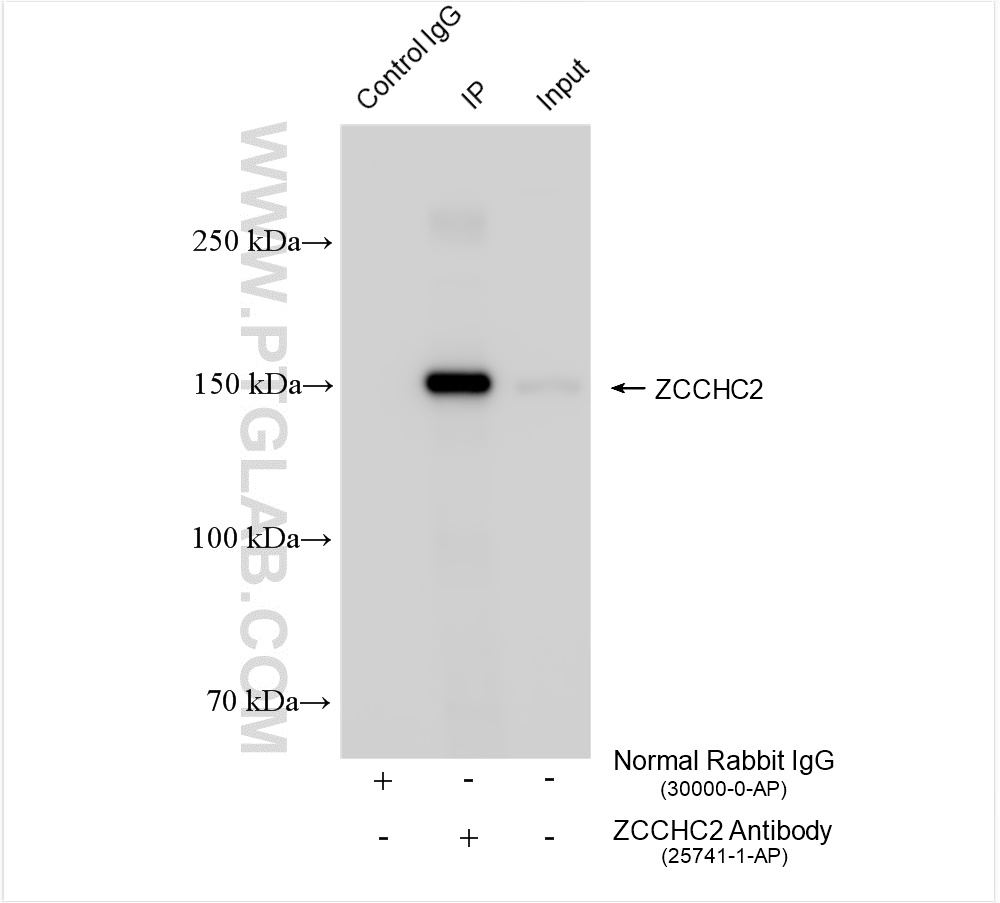ZCCHC2 Polyclonal antibody
ZCCHC2 Polyclonal Antibody for IP, ELISA
Host / Isotype
Rabbit / IgG
Reactivity
human
Applications
IP, ELISA
Conjugate
Unconjugated
验证数据展示
经过测试的应用
| Positive IP detected in | HeLa cells |
推荐稀释比
| Application | Dilution |
|---|---|
| Immunoprecipitation (IP) | IP : 0.5-4.0 ug for 1.0-3.0 mg of total protein lysate |
| It is recommended that this reagent should be titrated in each testing system to obtain optimal results. | |
| Sample-dependent, Check data in validation data gallery. | |
产品信息
25741-1-AP targets ZCCHC2 in IP, ELISA applications and shows reactivity with human samples.
| Tested Applications | IP, ELISA Application Description |
| Tested Reactivity | human |
| Immunogen | ZCCHC2 fusion protein Ag22744 种属同源性预测 |
| Host / Isotype | Rabbit / IgG |
| Class | Polyclonal |
| Type | Antibody |
| Full Name | zinc finger, CCHC domain containing 2 |
| Synonyms | KIAA1744, C18orf49 |
| Calculated Molecular Weight | 1178 aa, 126 kDa |
| Observed Molecular Weight | 150 kDa |
| GenBank Accession Number | BC006340 |
| Gene Symbol | ZCCHC2 |
| Gene ID (NCBI) | 54877 |
| Conjugate | Unconjugated |
| Form | Liquid |
| Purification Method | Antigen affinity purification |
| UNIPROT ID | Q9C0B9 |
| Storage Buffer | PBS with 0.02% sodium azide and 50% glycerol pH 7.3. |
| Storage Conditions | Store at -20°C. Stable for one year after shipment. Aliquoting is unnecessary for -20oC storage. |
背景介绍
ZCCHC2 is a poorly characterized protein of 126 kDa with long intrinsically disordered regions, a PX domain, and a CCHC-type zinc-finger (ZnF) domain. ZCCHC2 is distantly related to ZCCHC14 but lacks the SAM domain that is known to interact with the CNGGN pentaloop in 1E and PRE. ZCCHC2 is a critical host factor for K5. ZCCHC2 recruits the terminal nucleotidyl transferase TENT4 to elongate poly(A) tails with mixed sequences, delaying deadenylation. The observed molecular weight is consistent with what has been described in the literature (PMID: 37413987).
实验方案
| Product Specific Protocols | |
|---|---|
| IP protocol for ZCCHC2 antibody 25741-1-AP | Download protocol |
| Standard Protocols | |
|---|---|
| Click here to view our Standard Protocols |
